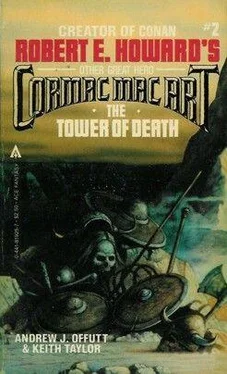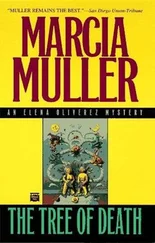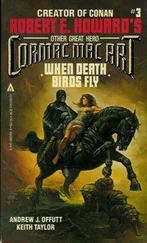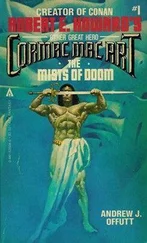Andrew Offutt - The Tower of Death
Здесь есть возможность читать онлайн «Andrew Offutt - The Tower of Death» весь текст электронной книги совершенно бесплатно (целиком полную версию без сокращений). В некоторых случаях можно слушать аудио, скачать через торрент в формате fb2 и присутствует краткое содержание. Жанр: Фэнтези, на английском языке. Описание произведения, (предисловие) а так же отзывы посетителей доступны на портале библиотеки ЛибКат.
- Название:The Tower of Death
- Автор:
- Жанр:
- Год:неизвестен
- ISBN:нет данных
- Рейтинг книги:3 / 5. Голосов: 1
-
Избранное:Добавить в избранное
- Отзывы:
-
Ваша оценка:
- 60
- 1
- 2
- 3
- 4
- 5
The Tower of Death: краткое содержание, описание и аннотация
Предлагаем к чтению аннотацию, описание, краткое содержание или предисловие (зависит от того, что написал сам автор книги «The Tower of Death»). Если вы не нашли необходимую информацию о книге — напишите в комментариях, мы постараемся отыскать её.
The Tower of Death — читать онлайн бесплатно полную книгу (весь текст) целиком
Ниже представлен текст книги, разбитый по страницам. Система сохранения места последней прочитанной страницы, позволяет с удобством читать онлайн бесплатно книгу «The Tower of Death», без необходимости каждый раз заново искать на чём Вы остановились. Поставьте закладку, и сможете в любой момент перейти на страницу, на которой закончили чтение.
Интервал:
Закладка:
It is a night for women to be abroad in hooded cloaks the colour of night , he thought with an inward smile. He had to assume, without enthusiasm, that it was the wife of Hermanric Marcellus who sought his company. “My… Lady Plotina?” he asked, as quietly as she had spoken.
Fabric rustled and a foot stamped. “No, damn ye for a rude foreigner.”
“Oh.” He glanced about, saw no one. “My lady,” he said, and ambled over to Eurika.
Her tiny voice said, “Plotina, hmm?”
“It’s both she and yourself stared at me whilst I ate. She, though, did not look away when our eyes met. I ignored her.”
“Oh? Why? Be ye a vegetarian?”
“Because she is another man’s wife,” he said, content not to mention other reasons, including Plotina’s meatiness.
“Ah. A pirate with morals.”
Her voice was hardly friendly, but ere he could remind her of that and that he preferred sleep to slurs, the king’s young sister said on.
“Do you despise me, mac Art?”
“My gracious lady… I do not.”
She nodded shortly. “All my life have I dwelt here, Cormac mac Art. Never never have I been allowed beyond even the confines of my brother’s personal demesne, and always with watchful eyes on me. I long to know of the world. You have seen it. Come with me and tell me of that great broad world out there beyond Treachery Bay, Cormac the Bold.”
“Come with you where?”
“Why, to my chambers, where we’ll not be interrupted.”
“My lady, methinks that would be both unseemly and dangerous. It’s happy I’ll be to talk with ye on the morrow. In the sunlight.”
“Hmp! Cormac the Bold becomes Cormac the Timid, is it?”
“Aye, lady Princess.” Those words hurt or reduced him not at all; Art’s son of Connacht had to respect a person before he paid heed to his opinion, or hers.
“Ye-ye say only ‘aye’…” There was wonder in her voice. “Such an admission does not disturb ye in the least, does it? Ye be so sure of yourself?”
“Aye,” he repeated, “lady Princess.”
Eurica stared wonderingly with the moonlight sparkling on her large blue eyes, and she sighed, and looked pensively downward. Cormac said “My lady,” and turned away to resume his way.
“I gave you no leave to go!”
He looked back at her without turning. “Then for your own pride, lady Princess, do so now, for it’s to my bed I’m going.”
And he did, and slept well, alone and with no snoring at hand, other than his own.
Nor, in the sunlight of the morrow, did Princess Eurica trouble herself to seek out the man from “Hivernia.”
CHAPTER NINE: Zarabdas of Palmyra
Cormac could not believe it. He searched his room again, both disturbed and greatly surprised. He was one to sleep like a cat and awake at the sound of a busy spider dropping to a ship’s deck from a taut sail. Yet while he had slept this first night in the hall of the King of Galicia, someone had entered the room and taken the Egyptian sigil on its chain!
He wore the linen under-leggings on which he’d laid it, and was sure it had not been there. At last, convinced that the medallion was indeed gone, he drew on his leathern leggings and tunic. He stood thinking a moment, narrow-eyed. And arranged his mailcoat on the bed, and slipped into its jingling, heavy links. Straightening, he buckled on weapons and pouch.
When he left the chamber, he took with him everything that was his. Only the buckler he would not carry, so as not to appear the prowling soldier and do insult to Veremund’s hospitality. Near the front door was a place reserved for the shields of weapon-men entering the hall; there Cormac left his own round buckler, made of the yew of Britain and braced and strengthened by bands of steel.
That day, when their paths happened to cross outside, he learned that Clodia had availed herself of her newfound nobility; she had nighted with none other than the king.
“Ye can hardly be continuing your masquerade of the highborn lady in his intimate company,” Cormac pointed out.
“Oh… he knows,” she said, and accompanied the words with an arch look. “Was you claimed I was a lady after all, not I. Once I knew he knew, I told him the truth.”
’The truth?”
“Aye!” The look she gave him this time was appealing. “You’ll not tell him different, will you, Cormac?”
“Different from what?”
“That I’m the daughter of a chieftain of the ancient Alani though I dare not name the specific house, for my father fell out with the Caesar before this one. I was raised by a rich merchant of Nantes.”
Cormac shook his head, eyebrows up. “No, Clodia, it’s no different tale I’ll be telling the king. In truth, ye lie as well as I. Do let me know, though, an ye change that story.” And he went on his way, his face looking strange wearing a whimsical little smile.
A mounted Irnic came upon him, and reined in. “Cormac! Why in full armour?”
Cormac looked mildly up at the Sueve. “It’s a weapon-man I am, Irnic. This is the way I am comfortable. Relieve me of the weight of forty pounds of mail and another dozen of weapons and belt, and I might float!”
Laughing, Irnic rode on, and the story had spread through all the comites and half the soldiers by nightfall. The peasants would have it by the morrow’s night.
A short time later, Cormac first saw Lucanor of Antioch. The leech was a portly man in a wine-dark robe who wore his curly, grease-glossy black hair to his shoulders. A gold ring flashed in his left ear. An unhappy look shadowed the fellow’s mouth and brow, which were separated by a thin nose with a bit of a crook. He was emerging from a noble house where he’d presumably been at the plying of his trade, and Cormac saw the gratitude on the face of the woman who saw the physician off.
He looked like the offspring of a Greek and an Armenian, Cormac thought, though in truth he’d never seen an Armenian.
It’s prosperous enow the fellow looks, and Rhodoghast never said he wasn’t competent. Just unhappy, for he’s been the king’s physician and is no longer. Well Lucanor, well… we all have our valleys and peaks and cliffs, in this life. Once I was a noble’s son of Connacht in Eirrin, and later a hero of Leinster, and I’ve been lover to a princess and… something similar to another. Are you too an exile who dreams of your homeland, old hawk faced greasehead?
He visited the heat-shimmering place wherein aproned men sweated and wore heavy gauntlets and boots of leather. There was one wall only. Five men laboured here. Three fed fuel constantly to keep their fire blazing high and hot. The others, with even more care, handled the lime from the Galician hills, calcining it into the more volatile quicklime. It seemed a simple enough process of heavy unpleasant labour, demanding constant exposure to the searing heat and the dangerous dust of the stinging lime, as well as poisonous fumes. Mac Art, who’d been feeling sorry for himself since his thoughts of Eirrin, decided he’d rather be in a battle against double odds than one of these sweating, miserable-looking men with their several lime-burns.
Later he had himself escorted to the coast. Wulfhere was already asea, with some of his crew along with Sueves: training. Cormac stood for a time, gazing across at the lonely, grim old tower. Restlessly the sea slapped at the jumble of rocks at its base, and Cormac wondered how long that salty assault had gone on.
The Romans built well , he mused, as he’d thought numerous times afore. And he was glad they had not builded and maintained their empire as well as they had their walls and forts and light-towers, their aqueducts and roads and superb bridges.
Читать дальшеИнтервал:
Закладка:
Похожие книги на «The Tower of Death»
Представляем Вашему вниманию похожие книги на «The Tower of Death» списком для выбора. Мы отобрали схожую по названию и смыслу литературу в надежде предоставить читателям больше вариантов отыскать новые, интересные, ещё непрочитанные произведения.
Обсуждение, отзывы о книге «The Tower of Death» и просто собственные мнения читателей. Оставьте ваши комментарии, напишите, что Вы думаете о произведении, его смысле или главных героях. Укажите что конкретно понравилось, а что нет, и почему Вы так считаете.












